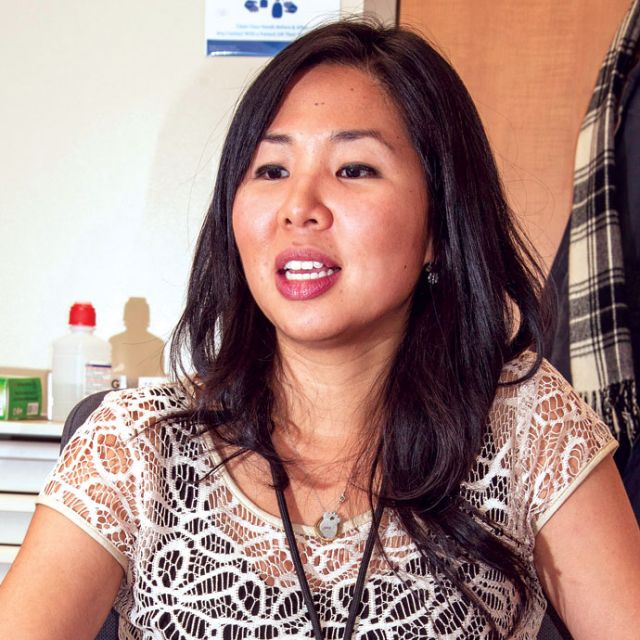“They say, ‘You’re a palliative care doctor and I got referred to you. What does this mean? Am I dying?’ ” Ying said. “I have to explain to them, ‘No. Your doctors referred you to me because they felt your quality of life, your symptom burden, was potentially poor and there’s something we can do about that — so you could live better.’ ”
The biggest misconception about palliative care is that it’s only for final-stage cancer patients, Ying told The Catholic Register.
Palliative care doesn’t necessarily kick in when a patient has just weeks or months to live. It’s any care which puts the question of a cure to one side and concentrates on easing pain, making patients more comfortable, helping them live a better quality of life.
After two years of working in palliative care Ying has come to Toronto’s St. Michael’s Hospital to apply palliative care to patients with chronic conditions other than cancer, diseases such as chronic obstructive pulmonary disease and liver disease. These are patients who aren’t necessarily facing death in the near term, but their lives can be restricted by their conditions.
Ying’s palliative care consultancy is an experimental program taking shape in the St. Michael’s department of family and community medicine. She’s looking for ways to measure the impact her consulting service has on both patients and family doctors, nurse practitioners, nurses and others who provide care.
“When I chose to be a physician it was born out of a desire to make people feel better. I found that the conventional way I was taught medicine really didn’t adequately teach me how to be very patient- centred. That’s what I found about palliative care. I found it’s very much about finding out more about the patient.”
The one thing people do get right about palliative care is that there isn’t enough of it to go around.
“If you speak to palliative care physicians, the general consensus is that you will never have enough palliative care physicians to see everyone who needs palliative care,” Ying said.
In 2011 the Parliamentary Committee on Palliative and Compassionate Care found that only 16 to 30 per cent of Canadians who need it actually receive palliative care.
The Royal College of Physicians and Surgeons of Canada and the College of Family Physicians of Canada upgraded palliative medicine into an accredited subspecialty in early December. It’s something that may attract more doctors into the field, said Ying, but the real solution is getting more family doctors involved.
If family doctors could get a little help from experts when they deal with patients who require palliative care they could do the job. Part of Ying’s role at St. Michael’s is doing just that.
“A family doctor can e-mail me or phone me and say, ‘Hey, I’ve got this situation,’ ” she said.
Opponents of legalizing euthanasia and assisted suicide often make the argument that universal access to palliative care is the better solution. The main opposition to legal assisted suicide in the United Kingdom is a coalition called Care Not Killing. The Canadian Society of Palliative Care Physicians has labelled Quebec’s Bill-52, which would reclassify assisted suicide as a form of end-of-life care, as “A bill that will cause confusion and suffering.”
“We are deeply concerned that this bill tries to introduce euthanasia in veiled terms by giving it a new name and incorporating it to the world of palliative care,” said Alberte Dery, president of the Palliative Care Network of Quebec.
Ying wants to stay away from the political and philosophical battles that surround her profession.
“That’s not really what I focus on here in this clinic,” she said.
She does frequently help patients who are not yet terminal to think about their desires for medical treatment at the end of life. She even helps some to put together advance-care directives.
“There’s this special attention paid to the end of life, but really I see it very much as a continuum,” she said. “Discussing advance-care planning is not any different than any other preventative measure we take as palliative care physicians or as family doctors or just doctors in general. We really advocate preventative care, and I think this is a part of that.”
Living with the uncertainty and stress of an unknown journey into the final days of life is hard on patients. But it’s just as hard on families.
“There are levels of post- traumatic stress among family members of (intensive-care unit) patients. So there’s a lot of emotional burden that comes along with that,” Ying said.
Arguing over what Mom would have wanted the doctors to do or not do doesn’t ease that stress at all. Advance-care directives are a preventative care measure for the whole family.
Ying talks to patients early on about “their philosophy of care.”
A patient’s approach to end- of-life medicine doesn’t stand alone. It’s something that goes with their whole approach to life, their experience of family, their understanding of themselves and all the ultimate questions about God, heaven, redemption and hope.
“(I’m) talking to family members about that so that when something does come up I can help them, guide them in their decision making and they will get a better sense of what their loved one wants,” Ying said. “So it’s good for the patient. It’s good for the well-being of families as well… The evidence shows that when we don’t have these discussions that patients do suffer. It comes back to that quality of life, which is what palliative care is all about.”
Ying doesn’t prod at her patients’ philosophy of life in a consulting room as though she were giving them a physical. She visits patients in their homes.
“If you look at the art hanging on the wall, I think you just get a better sense of who that person is,” she said. “And you’re better equipped to support them in their decision making.”

